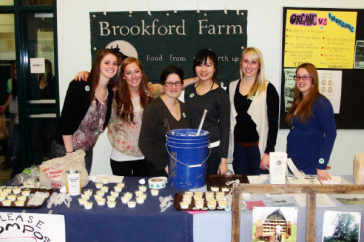UNH Survey Center: Romney Remains Atop Broad Republican Field in 2012 NH Presidential Primary; Voters Not Making Up Minds

L-R: UNH nutritional science interns Lauren Goldthwaite and Sarah Iske; Mary Brower of Brookford Farm; UNH students Vivien Fam, Kim Mayo, and Erin Greenhalgh Credit: Dover Foodservice staff
DURHAM, N.H. -- Mitt Romney continues to lead a congested field for the 2012 Republican nomination for president among New Hampshire Republicans. However, the great majority of voters are undecided about who they will eventually support.
These findings are based on the latest WMUR Granite State Poll, conducted by the University of New Hampshire Survey Center. Eight hundred ninety-seven (897) randomly selected New Hampshire adults were interviewed by telephone between April 15 and May 2, 2011. The margin of sampling error for the survey is +/- 3.3 percent. Included in the sample were 416 likely 2012 Republican Primary voters (margin of sampling error +/- 4.8 percent) and 303 likely 2012 Democratic Primary voters (margin of sampling error +/- 5.6 percent).
"The 2012 New Hampshire primary campaign heated up in April as several people declared themselves as candidates for the Republican nomination and several others have strongly hinted that they would run. But because primary elections are extremely volatile, any measure of voter preference this far in advance of the election is not indicative of the eventual outcome," said Andrew Smith, director of the UNH Survey Center.
Among likely Republican Primary voters, former Massachusetts governor Mitt Romney, the 2008 New Hampshire runner-up, has consistently been the most popular candidate. In the most recent WMUR Granite State Poll, 36 percent of likely Republican Primary voters said they would vote for Romney, who has been above 35 percent most of the time since February 2009.
Businessman Donald Trump, who has made the national news recently questioning President Barack Obama's birthplace, has moved up to second place with 11 percent, followed by former New York City Mayor Rudy Giuliani (7 percent), former Arkansas governor Mike Huckabee (6 percent), Texas Congressman and 2008 candidate Ron Paul (6 percent), 2008 Vice Presidential candidate Sarah Palin (4 percent), 6 percent prefer former Speaker of the House Newt Gingrich (4 percent), Minnesota Congresswoman Michelle Bachmann (4 percent), former Minnesota governor Tim Pawlenty (2 percent), and Indiana governor Mitch Daniels (2 percent).
"It is critical to point out that primary voters behave very differently than general election voters where there are no party cues to rely on, and almost all will vote for their party's eventual presidential candidate, no matter who that might be. Most primary voters do not settle on a choice until the very end of the campaign, so early poll numbers are a better gauge of a candidate's popularity now than an indication of who voters will end up supporting," Smith said.
In the most recent poll, 79 percent of likely Republican primary voters say they are still trying to decide who they will eventually vote for in 2012, 16 percent are leaning
toward a candidate, and only 5 percent say they have definitely decided who they will vote for.
Support for Republican candidates is currently based almost exclusively on their name recognition and favorability ratings. Mitt Romney consistently has had the highest favorability ratings among all likely Republican candidates. Currently, 70 percent of likely Republican primary voters say they have a favorable opinion of Romney. Romney's net favorability rating, the percentage who have a favorable opinion of him minus the percentage who have an unfavorable opinion, is a very high +49 percent.
Rudy Giuliani continues to be the second most popular Republican candidate with a net favorability rating of +30 percent, followed by Tim Pawlenty (+26 percent), Mike Huckabee (+13 percent), Rick Santorum (+12 percent), Mitch Daniels (+8 percent), and Ron Paul (+1 percent). The least popular Republicans are Newt Gingrich (-2 percent), Michelle Bachmann (-3 percent), John Huntsman (-3 percent), former New Mexico Gov. Gary Johnson (-5 percent), Sarah Palin (-13 percent), and Donald Trump (-14 percent).
While no Democrat has indicated that they plan to challenge President Barack Obama in 2012, his rather low job approval ratings may attract another Democrat, should they fall lower. When asked if they plan to vote for Obama in the 2012 New Hampshire Democratic primary, 69 percent of likely New Hampshire Democratic Primary voters say they do plan to vote for Obama, 9 percent say they plan to vote for some other candidate, and 22 percent are undecided about what they will do.
New Hampshire has a semi-closed primary in that undeclared voters (often called independents) can choose to vote in either the Democratic or Republican primary at the polls. Because it does not appear that there will be a Democratic challenger to President Obama, it is not a surprise that most undeclared voters say they plan to vote in the Republican primary. Currently, 48 percent of undeclared voters say they will vote in the Republican primary, 28 percent say they will vote in the Democratic primary, and 24 percent are unsure.
For complete tabular results, visit http://www.unh.edu/survey-center/news/pdf/gsp2011_spring_primary050411.pdf.
The UNH Survey Center has conducted survey research projects at the University of New Hampshire since 1976. The center has grown rapidly during the past 30 years and now conducts approximately 40 to 50 major survey projects each year.
The University of New Hampshire, founded in 1866, is a world-class public research university with the feel of a New England liberal arts college. A land, sea, and space-grant university, UNH is the state's flagship public institution, enrolling 12,200 undergraduate and 2,300 graduate students.
PHOTO
Andrew Smith, director of the UNH Survey Center.
/unhtoday/sites/default/files/newsroom/img/Andy_Smith.jpg
-30-
Latest News
-
April 15, 2025
-
Research Finds Rural Americans Carry Heavy Burden Accessing Social Security Benefits and InformationMarch 27, 2025
-
March 25, 2025
-
March 17, 2025
-
March 12, 2025














































